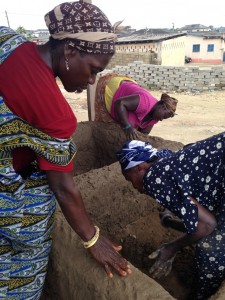Building Livelihoods from the Ground Up; Beneficiaries Pound Bricks Before Smoking Fish
Before heating the coals and smoking fish to sell at market, participants of the Challenging Heights Livelihoods Programme started from the ground up. They pounded bricks and smoothed edges to construct smoking ovens from a mud mixture made from termite mounds.
The hard work came with wide smiles. This is the work they women grew up on. The Challenging Heights Livelihoods Team knows that many people in the Winneba fishing community have come on hard times, but they have the skills and desire to get back to work so they can provide for their families and not consider selling their children into forced labour.
A pavilion stands overlooking the ocean slapping against the rocky shore. This plot of land Challenging Heights now owns on the coast of Winneba will soon be home to an all-inclusive fish-smoking facility, school and hospital.
The plan is to make sixty fish smoking ovens available to women who need a place to make their products. There will be a refrigerated cold store, where fish can be brought in bulk from the port at Tema (East of Accra) and stored for locals to buy with relative ease. Women will be able to smoke the fish in the shared ovens then sell the fish at market or in other towns with fewer time and travel constraints that were previously necessary.
As women smoke fish, the goal is for their children to be in school, on site, at a new school which will be constructed on the same property. A hospital is also planned for the land.
The Penkye area of Winneba is the main fishing community which lines the coast. It’s where families often struggle to make ends meet, and hard times have caused many women to lose their fish smoking and selling businesses. They haven’t been able to sell fish at markets, and they struggle to feed their families.
The Challenging Heights Livelihoods Programme offered a Fish Preservation Training, to teach some women how to smoke fish, but moreover, to provide families with seed capital to reinvigorate their businesses so families can support themselves.
Recently, women in the programme met at our site to construct the ovens themselves. The cement for the first nine ovens comes from a mud mixture made from termite mounds in the area. Male staff searched for and found multiple mounds with varying levels of suitability to mix. One of our gardeners found the best mound, which was not too sticky and didn’t need to be mixed with stone or gravel. Through a tedious process, staff collected the mud, but as they did, their truck got stuck in the mud! There was extra cost and time involved in towing the SUV, and the mud needed to be offloaded the next day.
The mud itself poses a challenge to mix. Instead of our female livelihoods beneficiaries taking on that task, we hired workers from a nearby prison. It took them more than four hours to mix the clay to the appropriate consistency, and then it was left to dry for a few days.
Soon, the women began forming clay bricks and carrying them to construct the walls of the ovens. They smoothed down the clay and built them higher, knowing that they would need to return every couple days to add to the eventual seven layers of clay.
Realising how difficult the clay brickwork can be, the women suggested that it is more cost effective and efficient to construct the rest of the ovens with premade cinderblocks.
The goal of this project is to get women in Winneba and surrounding areas back to work. At this time, their cost in travel to buy the fish and then to sell the fish in other cities, is not sustainable. It also requires mothers to leave their children unattended for long periods of time. If they are able to secure fish at a closer location (as they will with the Challenging Heights cold store), they will have an easier time selling fish to restaurants or food vendors and be able to spend more time with their children.
In the next few months, women will be able to buy their own fish, at cost, buy their own fire wood, and have access to smoking ovens. Our teams will also construct additional ovens, for free, in the homes of our beneficiaries.
It’s an opportunity the women say they’re excited to be a part of, and they know this will help them to sustain their families and livelihoods for years to come.
